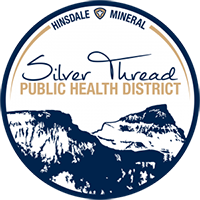Measles Press Release from Colorado Department of Public Health & Enviornment
With measles cases rising nationwide, state health officials urge MMR vaccination for Coloradans
With measles cases increasing across the U.S., the Colorado Department of Public Health and Environment urges Coloradans to get vaccinated against the highly contagious disease. The best protection against measles infection is the measles, mumps, and rubella (MMR) vaccine.
“We are seeing a concerning increase in measles cases across the country, including in states neighboring Colorado,” said Dr. Rachel Herlihy, state epidemiologist at CDPHE.
Measles is more than a rash. It is a serious respiratory illness that can cause life-long problems like hearing loss and brain damage. In the most serious cases, it can lead to respiratory failure and even death. Measles spreads easily. It can remain in the air for up to two hours and stays on surfaces, too. If one person has it, nine out of 10 people who are unprotected around them will get measles. People who are infected with measles can spread it to others from four days before they get the rash to four days after the rash shows up.
Measles was nearly eliminated from the U.S., but is making a return because fewer people are getting vaccinated. Large measles outbreaks are currently occurring throughout the country, including in Texas and New Mexico. According to the U.S. Centers for Disease Control and Prevention, as of Feb. 20, 2025, eight states had reported a total of 93 measles cases. In 2024, the U.S. recorded 16 measles outbreaks and 285 cases. Of the 2024 U.S. measles cases, 89% were among people who were not vaccinated and 40% required hospitalization. The national surge of measles presents a risk to all unprotected people.
The MMR vaccine is highly effective in preventing measles, providing about 93% protection after one dose and about 97% protection after two doses. The MMR vaccine is available for no or low-cost at doctor's offices, community health centers, pharmacies, public health clinics, and some schools.
CDPHE recommends that all children and adults who are not already immune get vaccinated. Children should get two doses of MMR vaccine, starting with the first dose at 12-15 months, and the second dose at 4-6 years. Infants 6-11 months of age should receive an early dose of MMR vaccine before traveling internationally, ideally at least two weeks before travel.
Adults who may need to be vaccinated include:
- Adults vaccinated before 1968 who received either inactivated (killed) measles vaccine or measles vaccine of unknown type, as the inactivated measles vaccine wasn't as effective.
- Adults who are unsure of their MMR vaccination history. There is no harm in getting a dose of MMR vaccine even if you may be immune already.
There is no recommendation for adults born between 1968 and 1989, who likely received just one dose of the measles vaccine, to receive a second dose of MMR.
CDPHE urges Coloradans to take the following steps:
- Get vaccinated: If you are unsure of your vaccination status, or if you have never received the MMR vaccine, talk to your health care provider about getting vaccinated. You may be able to find your or your child’s vaccine records through the Colorado Immunization Information System (CIIS) public portal. You can find a vaccine provider near you on CDPHE’s Get vaccinated webpage.
- Check your travel destination: Measles outbreaks are occurring in various parts of the U.S. and countries around the world. If you are traveling in the U.S., check CDC’s Measles Cases and Outbreaks webpage. If you are traveling internationally, check the CDC’s Global Measles Travel Health webpage.
- Know the symptoms: Measles symptoms typically appear 7-21 days after exposure and include:
- A high fever (may spike to more than 104°F).
- Cough.
- Runny nose.
- Red, watery eyes.
- Rash (3-5 days after other symptoms begin).
If you develop these symptoms, stay away from others as much as possible and contact your health care provider immediately. Health care providers caring for a patient suspected to have measles should contact the state or local public health agency immediately. CDPHE can be reached at 303-692-2700, or after hours 303-370-9395 (evenings, holidays, weekends).
“Protecting yourself and your community from measles is a simple but important step,” Dr. Herlihy said. “By getting vaccinated, we can prevent the spread of this dangerous disease and keep Coloradans healthy.”
More information about measles and the MMR vaccine is available on the CDPHE website.
